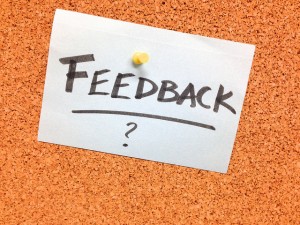 All of us know about the importance of giving and receiving feedback. If the goal is improved behavior or performance, effective and timely feedback is essential. Most of what we read on this topic is focused on how to give feedback. There is considerably less advice on how to get useful feedback from others.
All of us know about the importance of giving and receiving feedback. If the goal is improved behavior or performance, effective and timely feedback is essential. Most of what we read on this topic is focused on how to give feedback. There is considerably less advice on how to get useful feedback from others.
Most of us are not well equipped to receive feedback in a way that encourages people to be truthful. The person giving the feedback can easily be dissuaded from sharing the truth with you. The difference between receiving qualified feedback versus unvarnished feedback is determined by your reactions to the person who is giving the feedback. Without an honest assessment, it is difficult to change our personal behaviors that target our weaknesses.
Peter Bergman recently summarized some key actions that the receiver of feedback can take which will significantly increase the likelihood that the feedback will be useful. According to Bergman, there are five ways that we can improve the way that we receive feedback.
- Be clear that you want honest feedback. Let people know they’re doing you a favor by being truthful. Tell them to “Be helpful, not nice.” Explain that you want to get the most out of the conversation, and it won’t work if they hold back. Of course, the first time that you become defensive, they will stop being honest. Instead, they will hold back on what they say, so as not to have a similar reaction from you with their next comment.
- Focus on the future. Ask what you can do better going forward as opposed to what you did wrong in the past. By asking people what you can do to be more effective in the future, people tend to be more honest.
- Probe more deeply. Don’t just ask once. Give people several opportunities to give you real feedback, to increase the chances they’ll feel comfortable doing so. (One helpful question that I use: “What else can you share with me?”) Ask the person to refer to specific situations — for example, what could you have done better in a particular meeting?
- Listen without judgment. Try not to judge any feedback you receive, whether it’s positive or negative. Thank people for being honest with you and let them know that you find their observations and opinions helpful. This applies not only to what you say upon hearing the feedback, but your body language as well. If they think that you really want the truth and you won’t react poorly to negative feedback, they’ll be more willing to be completely honest.
- Write down what they say. A little silence communicates that you’re taking feedback seriously. It is an obvious expression of active listening and it gives those offering it time to think about what else they might say. While you are writing, they may offer additional thoughts as they become more comfortable in the conversation.
Getting useful feedback is essential to personal growth and improved performance. As Bergman states, the feedback you receive is not always an accurate reflection of who you are. But it is always an accurate reflection of how you’re perceived. And knowing how you’re perceived is critically important if you want to increase your influence as a leader.
References
How to ask for feedback that will actually help you. Peter Bergman. HBR.Org. December 2014.
Picture attribution: https://flic.kr/p/nKPbtE” Alan Levine.

